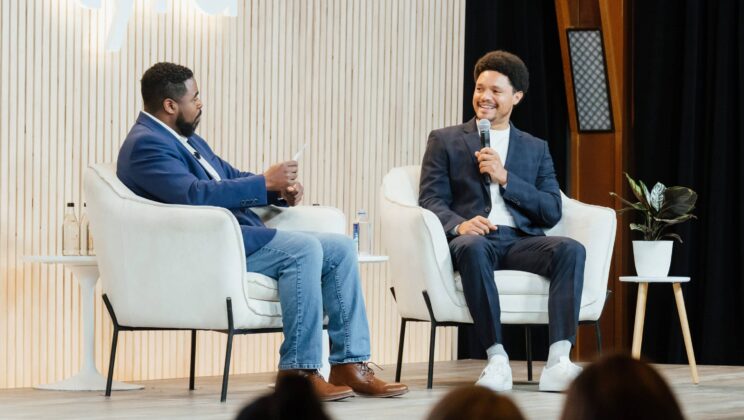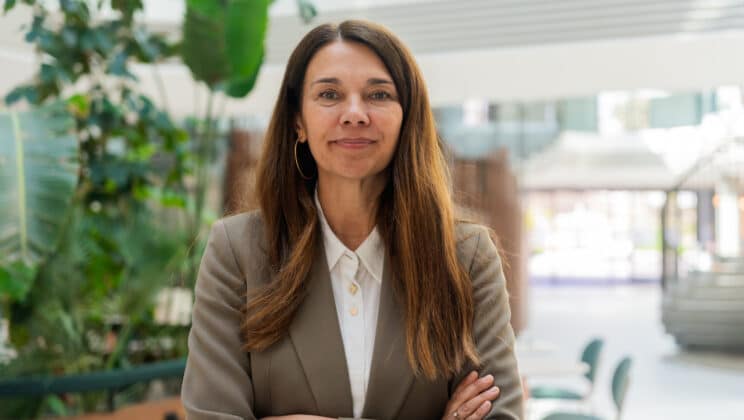Mental Health Leader Spotlight: Amy Bloomquist from Land O’Lakes

September 29, 2022
At Lyra, we have the honor of working with bold company leaders who are committed to championing workforce mental health and changing organizational culture. We hear inspiring stories every day of how they’re putting their people first and working hard to model positive mental health. This month, we’re kicking off our Mental Health Leader Spotlight to share their stories with you. First up is Amy Bloomquist, wellness manager at Land O’Lakes, who built the company’s wellness program from the ground up.
What was your journey to your role as wellness manager?
In my prior company, wellness—especially mental wellness—wasn’t a big focus of the company culture. Based on my own personal interest in wellness, I set up a walking challenge for employees. It was very popular, and we gradually started doing more. Eventually, I was offered the opportunity to focus on well-being full time, which I gladly accepted. When I came over to Land O’Lakes, I once again got to build out the entire wellness program from the ground up. My role sits on the benefits team and I work on all of our well-being programs, supporting physical, financial, and emotional well-being.
Why is mental health important to you?
Mental health is the foundation for overall health. I believe that if you don’t feel mentally healthy, it’s hard to feel motivated to take care of the rest of yourself. Our employees don't leave their stress or troubles at home. A big component of why mental health is important for us, especially with so many employees in manufacturing plants, is safety. If a plant employee is not focused on what they're doing because their mind is elsewhere, accidents can happen.
Why did your team decide to partner with Lyra?
About three years ago, we took a step back and evaluated whether our benefit offerings were effective and accessible. We found a few pockets where we needed more support, and one of them was emotional support. We wanted to reduce the wait time for getting employees into care because if somebody's trying to get support for mental health, they probably need it as soon as possible. They don't want to wait a month to see somebody. We also wanted people to be able to get virtual or in-person care depending on their preference, and we didn’t want cost to be a reason why people weren't seeking help. We went looking for a solution that would help us fill all of those needs. Lyra checked off all those boxes for us.
Can you share an experience from your work that you’re particularly proud of?
Early in the pandemic, we had an employee who wanted to see a provider in-person for couples therapy. Most providers were only offering virtual visits at this time, so his initial search in Lyra’s system didn’t include any nearby in-person therapists. We asked Lyra, “What can we do for this person?” and we were able to work closely with our customer success manager and the care navigator team to do a custom search and find a provider. It was a really special point of care for this employee. I believe every employee matters, and I’ve always found that Lyra really lives by this philosophy. Nobody gets left behind.
What’s the next big thing you’re working on?
Our next big project is tackling mental health awareness and stigma in our manufacturing plants. We’re having all of our plant managers and supervisors go through mental health training. We want them to be able to recognize when their teams are struggling, and know what to say and how to refer them to our programs. This fall we’re conducting a Lyra Workshop called “Curbing Burnout: Your Guide to Prevention and Early Intervention” at one of our national plant manager meetings.
This is a project that came to us from our leadership. They recognize that our employees have been essential workers throughout the pandemic and are struggling with so many other things happening in the world. Many are feeling burnt out. Our leadership wants everyone to be able to get the support they need. I’m very proud that we're also looking at this from the perspective of resources we can give our employees and managers to use on their own. We're also taking a step back and considering what we can do as an organization to help make this change. Our plants run 24/7 so we have some constraints, but our goal is to give people the flexibility they want so they can spend more time with family or doing whatever makes them happy.
What’s your favorite way to care for your own mental health?
I like to go on walks in the morning and listen to podcasts. I used to take my dog for a walk every morning, but I found that I couldn't listen to anything and always had to be aware of other dogs or people. So this summer I decided that my dog was staying home (Don’t worry, the dog still gets walked at other times!) and I was going to carve out time just for myself in the morning and not have to focus on anything or anyone else.
What advice would you give to other HR leaders?
Listen to your employees. Tap into your employee resource groups if you have them. They really know what's going on, what might be missing, and what people are looking for from the company. Also, I would encourage people to try things out. Pilot programs, take risks. If there's a program you're looking at, ask if you can have a trial and try it yourself first so you'll be able to speak to it and answer questions about it.
Can you share an anecdote that reminded you of why wellness is important to you?
I received an email from a manager who had just finished his talent talk with one of his direct reports. The manager found out this person was really struggling outside of work and was very stressed. Thankfully, the employee had started to see a Lyra provider and it was really helping him. This manager went so far as to say that had the employee not been using Lyra, he didn't think he would be sitting there with him that day. That type of story makes it all worth it. This benefit is saving lives and helping people come out of deep struggles so they can have a better quality life.
About Land O’Lakes
Land O’Lakes is headquartered in Arden Hills, Minnesota. Most of its employees work out of 150 manufacturing plants and distribution centers across the United States, many in rural areas. Land O’Lakes also has over 1,000 farmer-owners who help create a variety of dairy and plant-based food products.
Author
The Lyra Team
The Lyra Team is made up of clinicians, writers, and experts who are passionate about mental health and workplace well-being. With backgrounds in clinical psychology, journalism, content strategy, and product marketing, we create research-backed content to help individuals and organizations improve workforce mental health.
Explore additional blogs

Mental health at work
How to Spark Intrinsic Motivation on Your Team

Mental health at work
From Human Resources to Whole Humans: Rethinking Productivity With Trevor Noah

Mental health at work